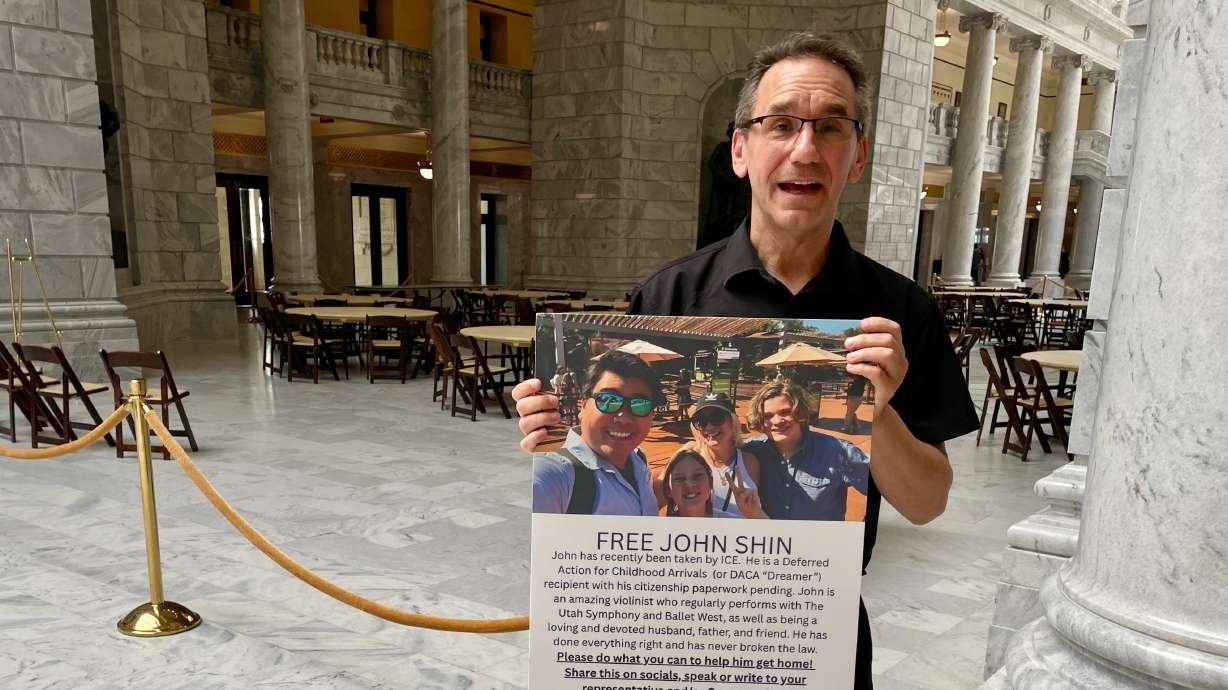SALT LAKE CITY — That federal immigration officials are taking aim at John Shin, a violinist originally from South Korea, is a misuse of resources, Gabriel Gordon charges.
“That is just way too much for somebody who gives so much to this community and to this society. He’s a great father and a great husband and a great friend and a great musician, and this just shouldn’t be happening to him,” said Gordon, a fellow violinist.
Shin, who has a master’s degree in music performance from the University of Utah and has performed with the Utah Symphony and Ballet West, has long lived in Utah. He now finds himself in a federal immigration detention center in Aurora, Colorado.
Shin’s Salt Lake City lawyer, Adam Crayk, offered stronger words. A hearing in his client’s case is set for next Tuesday.
“Unless there is something out there, some sort of smoking gun that the government is hiding that’s going to be revealed in his first court (appearance), this is one of the most dumb, idiotic, egregious wastes of federal resources that I’ve had to deal with in a while,” Crayk said.
Shin legally entered the country, he noted, and has been married to an American woman for four years.
Shin, brought from South Korea as a child by his father, was unexpectedly detained on Aug. 18 by immigration officials, part of President Donald Trump’s crackdown on illegal immigration across the country. The arrest has prompted a strong public outcry from his family and supporters. Gordon and oboist Nicole Fullmer — longtime friends — have been regularly playing music in the rotunda of the Utah Capitol in Salt Lake City to call attention to what they view as a miscarriage of justice.
“He is a wonderful person. He is good for the community. He is a positive influence on everyone he touches. He absolutely does not deserve to be deported,” said Fullmer. She studied music at the U. with Shin and Shin’s American wife Danae Snow, who plays the viola.
Regardless, as immigration officials ratchet up efforts around the country to detain and deport immigrants in the country illegally, federal officials offered their own tough response.
Gordon understands Shin entered the United States on an immigrant visa and later secured status under the Deferred Action for Childhood Arrivals program, which allows eligible immigrants brought to the country illegally by their parents to remain and work in the United States. However, a senior U.S. Department of Homeland Security official stated that Shin entered the country from South Korea in 1998 on a tourist visa. That visa, according to the official, required him to leave the following year.
“Over 25 years later, he was still illegally in the U.S.,” reads the statement to KSL.com from the official. Trump and Department of Homeland Security Secretary Kristi Noem “are committed to restoring integrity to the visa program and ensuring it is not abused to allow aliens a permanent one-way ticket to remain in the U.S. Our message is clear: Criminal illegal aliens are not welcome in the United States.”
While the Trump administration’s approach has garnered support from many, Shin’s backers are equally resolute, and the case underscores the complex sentiments the immigration issue has stirred. Shin and his family have received nearly $70,000 in donations from supporters as part of a GoFundMe campaign to raise funds for his legal defense and his backers are planning a benefit concert on Monday, Sept. 1, for Shin.
The case also highlights the debate about the weight of prior brushes with the law, particularly if they’re relatively minor, in determining whether immigrants face the force of the immigration crackdown.
The Department of Homeland Security said Shin’s “criminal history includes a DUI conviction,” that is, a conviction for driving under the influence, presumably of alcohol. Crayk, though, said the 2019 charge, originally driving under the influence, was ultimately reduced to the less-severe driving while impaired, a class B misdemeanor.
He said the impaired driving charge “requires no sort of forgiveness, no sort of waiver” to fix Shin’s migratory status.
“We just have to prove he entered the United States lawfully and that he is legitimately married to a United States citizen,” Crayk said. He didn’t immediately respond to a query about the significance of immigration officials’ contention that Shin overstayed a tourist visa, supplied after Crayk initially spoke with KSL.com.
Crayk blasted the apparent resources that immigration officials poured into Shin’s detention. He was detained, the lawyer said, by a special Department of Homeland Security team that typically focuses on immigrant fugitives involved in drug trafficking and other serious crimes. Indeed, at next Tuesday’s hearing, Shin will seek release from detention on bond, and meeting the requirements — showing that he’s not a danger to the community or a flight risk — “should be fairly easy,” Crayk said.
Meantime, Shin now regularly speaks by phone with his wife, though she was initially unable to reach him after his arrest. “He’s maintaining a relatively positive attitude,” Crayk said.
Members of the music community, for their part, are getting word out about Shin’s case and trying to drum up support for him. They’ve launched a letter-writing campaign aimed at the immigration judge in Shin’s case to demonstrate the community’s backing for him. Next Monday’s benefit concert, featuring Shin’s musician friends and Kurt Bestor, a Grammy-nominated musician, is set for 7 p.m. and will be held at First United Methodist Church at 203 S. 200 East in Salt Lake City.
“John is probably one of the kindest people I know. He’s just always very positive and upbeat,” Fuller said. “There has been a huge outpouring of people, both who know him and/or know Danae and people who even don’t necessarily know them personally but have worked with them.”
Gordon thinks there are more problematic issues than Shin.
“There are actual problems here in this country that need to be solved. John and people like him are not one of them, that’s for sure,” he said. “They add to our country, and they add to our society and they should stay.”
The Key Takeaways for this article were generated with the assistance of large language models and reviewed by our editorial team. The article, itself, is solely human-written.












































